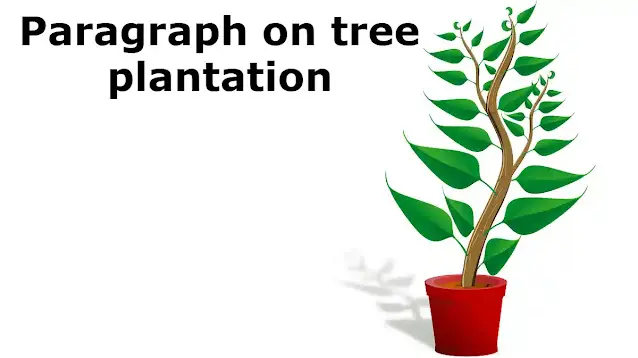Tree Plantation Paragraph
Tree plantation plays a crucial role in maintaining the ecological balance of our planet. Trees are often referred to as the lungs of the Earth. It is the ability to absorb carbon dioxide and release oxygen through the process of photosynthesis. This process helps mitigate the effects of climate change by reducing the concentration of greenhouse gases in the atmosphere.
Trees combat soil erosion, prevent landslides, and provide habitats for various flora and fauna. One of the most significant advantages of tree plantation is its positive impact on the environment. Trees act as natural air purifiers, filtering out harmful pollutants from the air and improving air quality.
It also plays a vital role in preventing soil erosion by stabilizing the soil with its extensive root systems.
Furthermore, tree plantation contributes to the conservation of biodiversity. By planting trees, we create new habitats for wildlife and help protect these species from habitat loss and fragmentation. Trees also provide food and shelter for various animals, birds, and insects, contributing to the intricate web of life on Earth.
Tree plantation offers numerous social and economic advantages. It provides shade and relief from the sweltering heat, creating comfortable spaces for outdoor activities.
Economically, tree plantation plays a role in sustainable resource management. Many trees yield valuable products like timber, fruits, nuts, and medicinal extracts, which can contribute to local economies.
In conclusion, tree plantation is a critical endeavor that addresses environmental, social, and economic challenges. By participating in tree planting campaigns and supporting reforestation initiatives, individuals, communities, and governments can collectively contribute to a healthier planet.
Tree plantation paragraph For Class 7 (150 words):
Tree plantation is an essential practice that helps our planet to stay green. Trees are like the lungs of the Earth. It takes in carbon dioxide, which is a harmful gas and gives out oxygen. This process helps keep the air clean and fresh.
Trees provide shade on hot days, giving us a cool place to rest. It also prevents soil from washing away during heavy rains. Many animals and birds make their homes in trees. Without trees, they would lose their habitats.
Governments and organizations also play a big role in tree plantation. They create parks and forests where many trees can grow together. Planting trees in cities is important too, as they clean the air and make the surroundings more beautiful. Trees give us oxygen, shade, fruits, and a better environment.
Tree plantation is a simple yet powerful way to make a positive impact on our planet. By planting trees, we are ensuring a better future for ourselves and for the generations to come. So, let’s plant some trees, and watch our world transform into a greener and happier place.
Tree plantation paragraph For Class 8 (200 words):
Trees work like nature’s air purifiers. It takes in the carbon dioxide we breathe out and gives us fresh oxygen in return. This oxygen is essential for all living things, including humans.
Trees also prevent soil erosion, which stops the soil from washing away when it rains. It provides homes for animals and birds. Trees give us shelter from the sun, making outdoor time more enjoyable.
In school, we learn how important trees are for our planet. We get to be tree planters ourselves, putting small trees into the ground. So, let’s keep planting trees and being the Earth’s helpers. By taking care of our trees today, we’re making sure that tomorrow’s world will be full of green, clean, and beautiful places for us.
Tree plantation is a significant endeavor that holds the key to a sustainable future. As the human population grows and urbanization expands, the need for trees becomes even more critical. Trees not only provide us with oxygen but also offer shade, habitat for wildlife, and prevent soil erosion.
Initiating tree plantations in schools can foster environmental awareness among students. Planting a variety of native trees helps preserve biodiversity and supports local ecosystems.
Tree plantation paragraph For SSC (250 words):
The practice of tree plantation becomes an essential act to restore the balance of nature. Trees are the guardians of our environment, playing a pivotal role in sustaining life on Earth.
Trees act as the Earth’s lungs with their remarkable ability to absorb carbon dioxide and release oxygen. This process helps cleanse the air we breathe, mitigating the harmful effects of pollution and global warming.
Moreover, trees combat soil erosion, holding the ground together and preventing land degradation. It provides habitats for countless species, ensuring biodiversity and ecological stability. The shade provided by trees is not just a respite from the sun; it is an oasis of comfort for both humans and wildlife.
By planting a variety of native trees, the ecological balance can be restored. It can benefit both the local ecosystem and the larger environment.
Governments and organizations recognize the significance of tree plantation and often initiate large-scale afforestation projects. These efforts are not limited to rural areas; urban tree plantation is gaining prominence as cities recognize the need for cleaner air, cooler temperatures, and healthier lifestyles.
tree plantation is a journey towards revitalizing our planet. It signifies a deeper understanding of ecosystems, biodiversity, and climate change mitigation.
Trees are the lungs of our planet, absorbing carbon dioxide and releasing oxygen. It helps to mitigate the impacts of global warming. Beyond their role in climate regulation, trees also provide habitat for numerous species, prevent soil erosion, and improve air and water quality.
Tree plantation paragraph For HSC (300 words):
In an era marked by environmental challenges, tree plantation stands as a multifaceted solution, addressing various aspects of ecological degradation.
The depletion of forests has resulted in disrupted ecosystems, loss of biodiversity, and increased greenhouse gas emissions. However, by planting trees strategically, we can counteract these detrimental effects and work towards a harmonious coexistence with nature.
One of the most significant benefits of tree plantation is its impact on climate change. Trees act as carbon sinks, absorbing atmospheric carbon dioxide and thus helping to regulate global temperatures. This is especially crucial in the face of rising carbon emissions. Furthermore, trees play an essential role in maintaining water cycles, preventing soil erosion, and providing habitat for countless species.
Educational institutions play a pivotal role in driving the message of tree plantation homes. Integrating environmental awareness programs into the curriculum can cultivate a sense of responsibility among students.
On a larger scale, governments and non-governmental organizations should take tree plantation initiatives. Reforestation projects aim to restore degraded landscapes and promote sustainable land use practices. Moreover, urban tree plantation is gaining momentum, as cities strive to combat air pollution, provide green spaces, and enhance the quality of urban life.
In conclusion, tree plantation transcends mere environmental conservation; it is a comprehensive approach to ensuring a healthier planet for current and future generations. By recognizing the multifaceted benefits of trees and taking active measures to plant and protect them, we contribute to the restoration of ecosystems, mitigation of climate change, and preservation of the Earth’s natural beauty.

